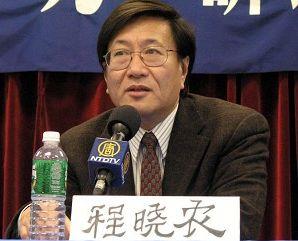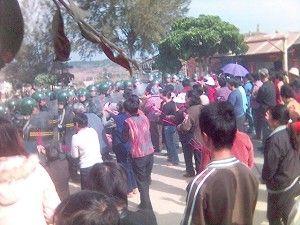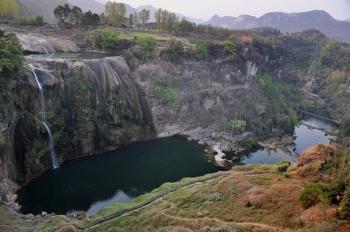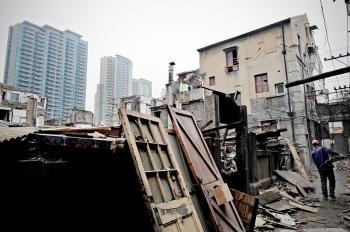CHINA — On the eve of December 6, 2005, in Shanwei city, Guangdong province, several thousand soldiers and riot police massacred protesting villagers in Dongzhou town with rifles and tanks. The Xinhua News Agency, Beijing’s official mouthpiece, did not report the incident until December 10, and indicated that “a few people incited a severe illegal incident, beating, damaging and burning...,” and claimed that only three persons were accidentally killed, and eight persons mistakenly injured. But, according to local witnesses, dozens of people were shot dead.
The Xinhua News Agency also claimed that the ground commander who issued the order to fire on the villagers has been detained under criminal charges, but refused to disclose the person’s name or identity. According to the mainland investigative Hong Kong newspaper, Takungpao, the ground commander is currently in detention, and is Wu Sheng, the Deputy Director of the Shanwei Municipal Public Security Bureau. Does a small city’s deputy security bureau director have the authority to command several thousand armed troops with tanks ,and police, to open fire on innocent civilians?
The following is an exclusive interview with China issues expert, Dr. Cheng Xiaonong, the Editor-in-chief of Contemporary China History Studies magazine. He shared his understanding about the background of the incident and offered The Epoch Times an in depth analysis.
The Severity of the Shanwei Shooting Incident
Journalist: Many media say that in the Shanwei incident, the Chinese Communist Party once again used soldiers and tanks to kill its own people, much like the 1989 Tiananmen Massacre. Would you share your opinion?
Dr. Cheng: The severity of the incident has several aspects; first, the authority mobilized heavy military arms, notably tanks, and more than one. This is really serious, in other words, the army has been involved in this situation. Because armed police have no tanks, only military fighting units use tanks; second, the Shanwai shooting incident is a cooperative effort of the army and police, which killed many people. We still have no idea of the exact number killed, because of the strict information blockage. From these two points, we know that the government authority has made up its mind to deal with the “uprising” at any cost, and the severity surpassed past incidents.
Because of a land acquisition dispute, especially the distribution of sales proceeds after the land was sold, it implied that many corrupt officials were involved, and there are too many cases like this one. The Taishi village incident also occurred in Guangdong province not long ago. Why are local governments so brutal? Why must they use violence, even employing the use of heavy military arms to crack down on their own people? What villager has a single piece of steel at hand to defend himself? I think it is the problem of the government turning into a corrupt gangster.
The local government system has become corrupt. This systemic corruption is at all levels of government from village to county, towns and even cities are corrupted. If one of them falls, the whole bunch of them will fall. It actually becomes a problem of whether to let corrupt officials die or let the people die. At this time, the real character of the communist government is blatantly visible. It is an autocratic government, it spares no effort to achieve its goals, it can kill, and this response is the same as the Tiananmen Massacre; in order to protect bureaucratic interests, it can use any military equipment, and its vile nature is fully exposed to the world’s people.





